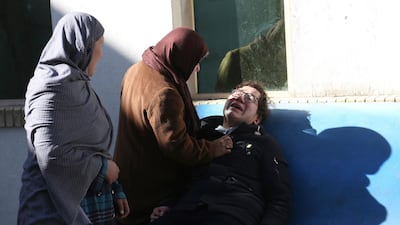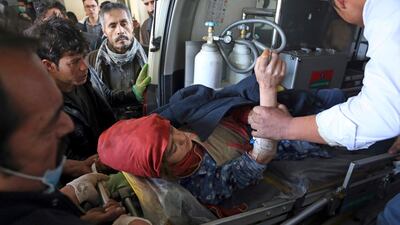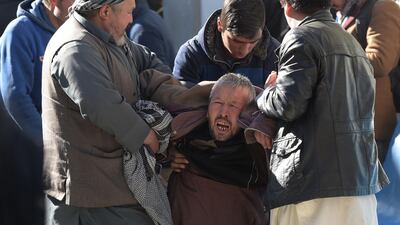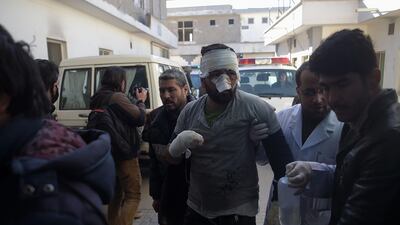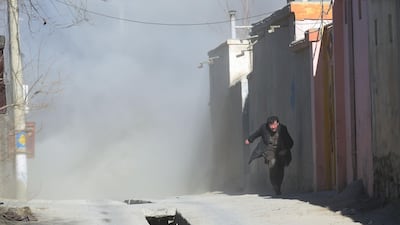A suicide bomber blew himself up in a compound that houses Afghan Voice, a news agency and the Tebyan Shiite cultural centre, killing more than 40 people, including two children, and injuring more than 50 others.
"The target of the attack was the Tebyan cultural centre. A ceremony was being held to mark the 38th anniversary of Soviet invasion in Afghanistan when the explosion went off," said deputy interior ministry spokesman Nasrat Rahimi.
Photographs sent by witnesses showed what appeared to be serious damage at the site and a number of dead and wounded on the ground in the latest violence to hit the Afghan capital.
Several smaller explosions, believed to be hand grenades and sticky bombs — magnetic devices that are attached to vehicles or other objects for later detonation — were also reported on Thursday morning.
“I saw eight police rangers putting injured and dead people in their vehicle like bricks,” said Mohammad Hakim, 19, who rushed to the scene because he has friends living nearby.
"I heard two large explosions a little after 10am and have been hearing ambulance sirens for the last two hours. This many ambulances mean the casualties are high," Kabul resident Mustafa, 28, told The National. "Everyone here knows that the Shia mosques and cultural places are under threats from ISIS. This is the actions of the enemies of Islam."
ISIL has indeed claimed responsibility for the attack.
At the police cordon, a woman stood crying and begging the security officials to let her in to the shattered building. “Her son was attending the event at the cultural centre. She was in tears and didn’t know if he had survived the attack,” Muhib Shadan, an eyewitness explained.
The centre is close to the Afghan Voice Agency, a media outlet which earlier reports had suggested could be the target. Media groups have often been targeted in Afghanistan in recent years, and especially so this year. The most recent attack was on a private television channel in Kabul last month which claimed the lives of two journalists..According to a report this month by media freedom group Reporters without Borders, Afghanistan is among the world's most dangerous countries for media workers.
Both the cultural centre and the media group have strong ties to Iran, while the neighbourhood in which the explosion happened, Pul-e-Sokhta, in western Kabul, is also densely populated by Afghan Shia and Hazara ethnic groups, who have been targeted several times this year. The cultural centre was hosting an event for the 38th anniversary of the invasion of Afghanistan by the Soviet Union, when the bomb went off in the basement of the building. Sources at the Afghan voice agency confirmed that all those attending the event were either killed or severely injured and shared photos of the attack on their social media accounts, as well as posts honouring one of their journalists who was among the dead.
Attacks on the Shiite minority in Afghanistan have been rising steadily, many of them committed by ISIL insurgents. There were seven in 2017 which killed up to 400 civilians. Nearly all were claimed by ISIL, which is fast winning support in Afghanistan.
While the Taliban has denied responsibility for Thursday morning's attack, they have in the past targeted media organisations in Afghanistan including the attack on Tolo News crew that killed six media professionals.
“Attack in Puli Sokhta area of Kabul city today has nothing to do with the Mujahidin,” tweeted an account associated with Taliban spokesperson Zabihullah Mujahid. “It is said that target of attack was media centre & education facility. Mujahidin of IEA are very cautious about such areas & do not commit such acts.”.
The country’s president and chief executive both condemned the attack. President Ashraf Ghani called it a crime against humanity, adding, “The terrorists have killed our people. The terrorists have attacked our mosques, our holy places and now our cultural centre. This is an attack on Islam and all human values."
However, residents of west Kabul say they need more than condemnations to reassure them.
“I am tired of living in this land, hearing blasts and seeing blood every day of my life,” said Mr Hakim as he waited for news on his friends. “It makes me so sad to see these cowards committing suicide attacks in the name of religion and killing innocent people. Why can’t our leaders at the NUG (Afghanistan’s National Unity Government) do anything about it? We want them to be accountable."
_____________________
_______________
Read more:
Six killed in suicide attack near Afghan intelligence agency
At least 14 dead in suicide attack outside Kabul wedding hall


